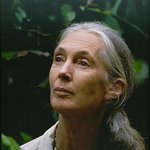Dr. Jane Goodall, DBE, founder of the Jane Goodall Institute, UN Messenger of Peace and world-renowned ethologist and conservationist, whose groundbreaking discoveries changed humanity’s understanding of its role in the natural world, was announced last week as the winner of the 2021 Templeton Prize.
The Templeton Prize, valued at over $1.5 million, is one of the world’s largest annual individual awards. Established by the late global investor and philanthropist Sir John Templeton, it is given to honor those who harness the power of the sciences to explore the deepest questions of the universe and humankind’s place and purpose within it. Unlike Goodall’s past accolades, the Templeton Prize specifically celebrates her scientific and spiritual curiosity. The Prize rewards her unrelenting effort to connect humanity to a greater purpose and is the largest single award that Dr. Goodall has ever received.
“We are delighted and honored to award Dr. Jane Goodall this year, as her achievements go beyond the traditional parameters of scientific research to define our perception of what it means to be human,” said Heather Templeton Dill, president of the John Templeton Foundation. “Her discoveries have profoundly altered the world’s view of animal intelligence and enriched our understanding of humanity in a way that is both humbling and exalting. Ultimately, her work exemplifies the kind of humility, spiritual curiosity, and discovery that my grandfather, John Templeton, wrote and spoke about during his life.”
Dr. Goodall has caused a revolution in how scientists and the public perceive the mental, emotional, and social complexity of animals, regarding them as extensions of ourselves. She proved that they have individual personality, forethought, and complex societies, much like human beings. Raised Christian, she developed her own sense of spirituality in the forests of Tanzania, and has described her interactions with chimpanzees as reflecting the divine intelligence she believes lies at the heart of nature. Most importantly, throughout her career, Dr. Goodall has championed the value of all life forms on Earth, changing both scientific practice and the culture at large.
“I have learned more about the two sides of human nature, and I am convinced that there are more good than bad people,” said Dr. Jane Goodall, in her acceptance statement for the Templeton Prize. “There are so many tackling seemingly impossible tasks and succeeding. Only when head and heart work in harmony can we attain our true human potential.”
“I can identify closely with the motto that Sir John Templeton chose for his foundation, How little we know, how eager to learn, and I am eternally thankful that my curiosity and desire to learn is as strong as it was when I was a child,” she added. “I understand that the deep mysteries of life are forever beyond scientific knowledge and ‘now we see through a glass darkly; then face to face.’”
As the 2021 Templeton Prize laureate, Dr. Goodall filmed a reflection on her spiritual perspectives and aspirations for the world and an interview with Heather Templeton Dill to announce her award. She will participate in the 2021 Templeton Prize Lectures in the fall.
Dr. Jane Goodall’s legacy extends beyond her research. As a conservationist, humanitarian and advocate for the ethical treatment of animals, she is a global force for compassion, and an icon to millions around the world. Despite being grounded by the pandemic, her influence and popularity have grown with her virtual participation in events and lectures around the world. Since March 2020, Dr. Goodall has spoken to thousands of people in more than 150 countries, launched a podcast, The Hopecast, from her attic studio in England, and at the age of 87 is reaching millions of people through social media.
Goodall is the first ethologist and the fourth woman to receive the Templeton Prize since its inception in 1972. The Templeton Prize winner is selected following an extensive selection process that mobilizes an anonymous group of expert nominators from a diverse cross-section of fields, followed by a rigorous ranking process through a panel of judges, who have included royals, former presidents, scientists, and religious leaders. Judges rank nominees according to a range of criteria before scores are calculated for a winner.
Under the leadership of Heather Templeton Dill, in 2020 the Templeton Prize updated its nomination process to produce a more diverse candidate pool for its award. Such steps included encouraging the nominations of women, increasing the number of female nominators and judges to more than half, and making a priority of recruiting diverse backgrounds and experiences in the nomination and selection process.
Goodall joins a list of 50 Prize recipients including St. Teresa of Kolkata (the inaugural award in 1973), the Dalai Lama (2012), and Archbishop Desmond Tutu (2013). Last year’s Templeton Prize went to geneticist and physician Francis Collins, Director of the National Institutes of Health and leader of the Human Genome Project, for his demonstration of how religious faith can motivate and inspire rigorous scientific research. Other scientists who have won the Prize include Martin Rees (2011), John Barrow (2006), George Ellis (2004), Freeman Dyson (2000), and Paul Davies (1995).





